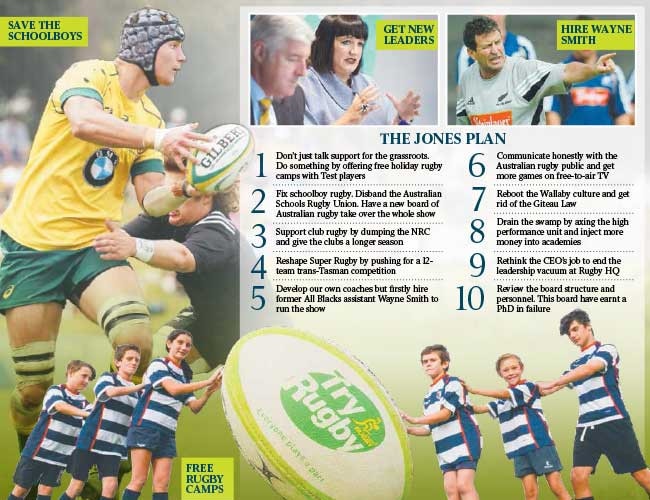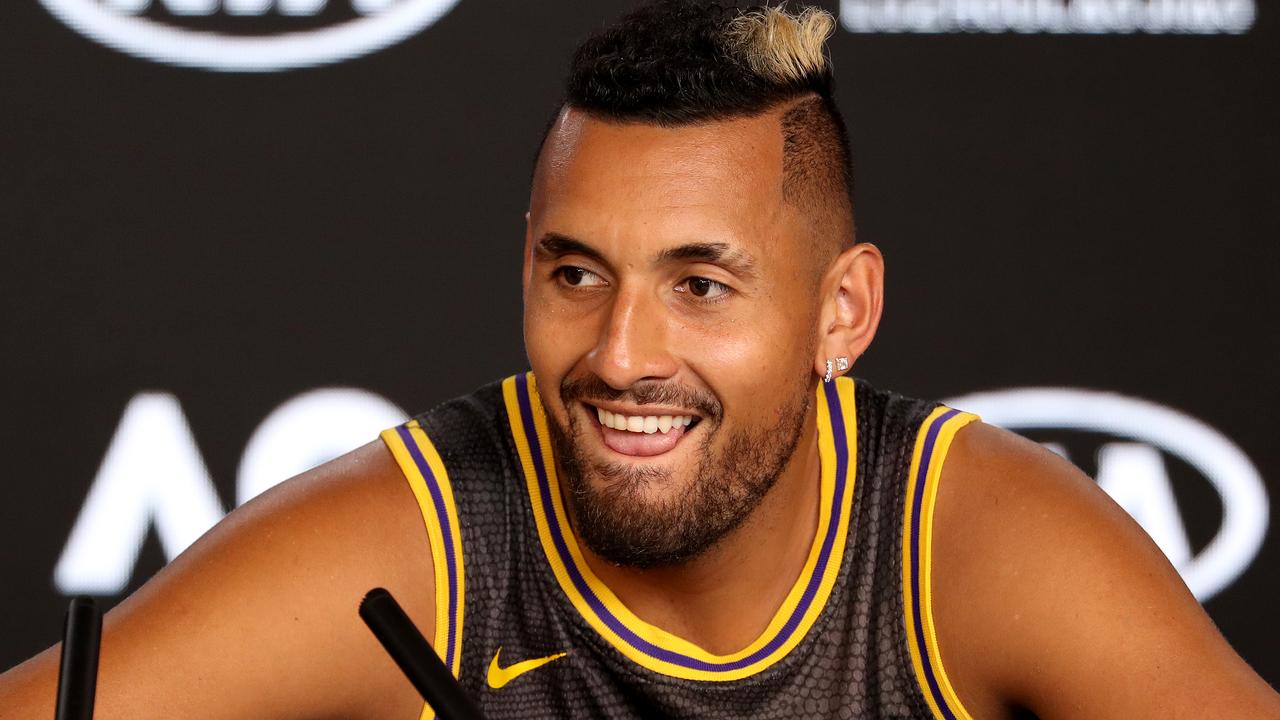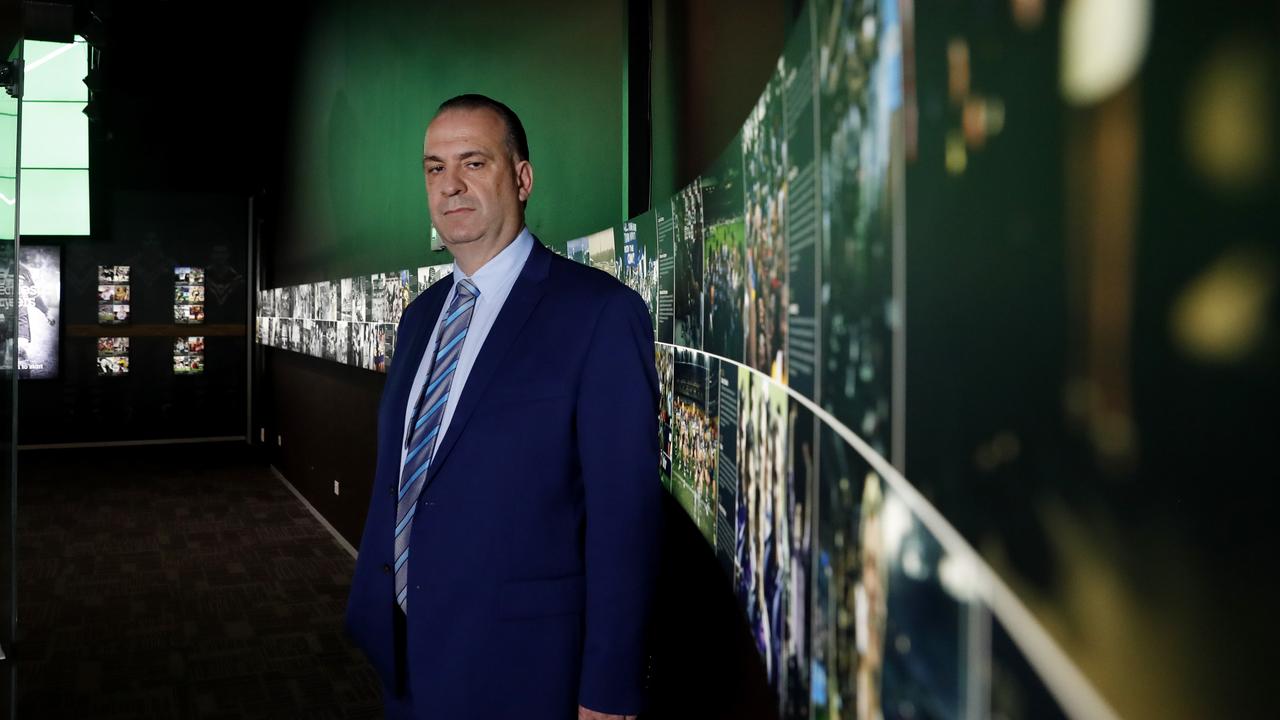My 10-point plan for saving Australian rugby
Raelene Castle may ignore this blueprint for saving Australian rugby but can she at least show there’s someone home at HQ.

I am gratified by the continuing remarkable response to the substance of these rugby columns. But I am equally disturbed that readers’ comments indicate disappointment, anger, frustration and, unfortunately, abandonment of the game.
Many people are accessing this column through social media — this newspaper’s own website and my Facebook page, Alan Jones.
Last week’s column on social media reached 64,650 people and remember, I’m dealing here with a niche issue. Your comments, hundreds of them, are illuminating and, for Australian rugby, should be disturbing.
• “Rugby Australia is the purist description of a gravy train. Everyone on board is earning a motza, but nobody is driving the bloody thing …”
• “I was a rusted on fan but wouldn’t cross the street to watch a Super Rugby game now…”
• “I stopped watching the game I love when they dumped the Force …”
• “Answers please, Raelene …”
• “Arrogance doesn’t grow the game …”
• “Time for the Old Boys’ club to move on …”
• “After last night, surely Australian rugby has hit the lowest of low.”
Well, the “last night” referred to was the defeat of NSW by Auckland, who had won only two out of their nine games to that point. Going into the match, the great Mark Ella had written in this paper: “Australian teams have lost 36 consecutive games by New Zealand opposition, but the Blues (Auckland) have been just as bad against their fellow Kiwis, not having won a game against a New Zealand side for two and a half years.”
Ominously, Ella wrote: “If the Waratahs could not score a single point against the Lions at home, how could you have any confidence in them against the Kiwi sides, even a team with low self-esteem like the Blues.”
The Mark Ella story appeared on Saturday, the day after the Crusaders had beaten the Melbourne Rebels 55-10.
Ella wrote, “if Australian teams keep losing to New Zealand opposition, what ramifications will that have for the future of Super Rugby ... would SANZAAR boot Australia out for being uncompetitive the way the Sydney Rugby Union got rid of the Penrith Emus ... if the Waratahs lose to the Blues, God help us.”
Hours later, Auckland 24, NSW, with a stack of territory and possession, 21.
This all occurred in a week in which one senior rugby league journalist wrote: “Raelene Castle is fortunate she got her new gig at Rugby Australia before details of the salary cap mess she left behind at the Canterbury Bulldogs became public knowledge.”
As I wrote last week, there was apparently no checking with Canterbury before the board of Rugby Australia appointed Castle.
As I also wrote, the appointment of the CEO may well be a board’s most important decision, as we have now seen with the farce at AMP. There, the CEO has left, other members of the AMP board have gone. Yet, the board of Rugby Australia sticks like cement to its entitlements.
Many of you rightly ask, what should be done? I have spoken and written publicly, often, about what should be done. But sadly, the road back is going to be long and tortuous.
We are now talking about the very survival of the game. I don’t pretend what I’m about to say is a “blueprint”. I’ve never been into this KPI stuff and all that jargon.
Most complicated issues whether they are in politics, business or sport, admit of relatively simple answers. Here are some:
First. Don’t just talk support for the grassroots. Do something. Take on the AFL and the NRL by cutting fees for kids and offering free holiday rugby camps.
Sack a few of the useless, underemployed 140-odd people at head office in order to find the money. Parents will love it.
Demand that all professional players offer their time free to help out at these camps. Once upon a time, when we were top of the world, the international players returned to their clubs and fertilised the emerging rugby talent. It doesn’t happen now.
We have to go back to what worked. Free holiday rugby camps would be a start.
In the past, Camp Wallaby has cost parents $130 a day for a rugby camp. Find a sponsor to support the initiative and cover insurance costs.
Come on, Mr Clyne, you’re supposed to be a former head honcho with the banks. Knock on some doors for a few bob and earn your spot as chairman. Then run the camps through the clubs and let the clubs make a quid selling burgers and drinks. If that’s too hard for you, we are in big trouble.
Second, fix schoolboy rugby. Disband the Australian Schools Rugby Union. Have a new board of Australian rugby take over the whole show. Not, I might add, the current mob who have led us into this mess.
But let’s ensure no more political selections of those who run schoolboys rugby or of those chosen to play. And let’s have some consideration of the welfare of these young players. At the moment, our schoolboys are asked to play up to four games in one week at the Australian Schoolboys’ Trials. Many of the best players are run into the ground. And they finish up, to use the vernacular of the changing room, as busted arses. Why wouldn’t they give the game away?
Simply forget the trials and have Rugby Australia run a series of camps to identify and develop the best talent. Good coaches would prefer to work with players before they are selected. Other countries do this already. It’s a no-brainer.
Thirdly, support club rugby by dumping the NRC and give the clubs a longer season with more home games. Help them invest in facilities. Find some sponsors, Cameron Clyne, to help build the latest AstroTurf pitches like the new ground at Easts in Sydney.
These new pitches are everywhere in Europe and they can be used far more than regularly-used pitches, in any conditions. Imagine no more rained-out fixtures because grounds are shut down due to possible damage to the playing surface. And what would such gestures do to the image of the game by suggesting a proactive administration thinking of its future?
Fourthly, reshape Super Rugby. What we have is unworkable and unaffordable and I will talk about that in later columns. Push for a 12-team trans-Tasman competition. Bring back the Western Force and give five Australian teams the chance to play against seven New Zealand teams.
That would put the wood on New Zealand. They’d have to share their resources with seven teams. And readmitting the Force would bring Andrew Forrest back to the table to talk about his rejected potential $50 million investment. At least people will be able to watch the games and understand the format.
I repeat, not only is no one getting up at 2am to watch a rugby match in South African time, but we are not responsible for South African, Argentinian and Japanese Rugby.
When we ruled the world, our international season began with trans-Tasman competition.
Fifthly, develop coaches. Hire Wayne Smith, probably the best coach in the world right now who’s left the All Black coaching team. He’s free. I’m sure he’s fired up and ready for a new challenge. Why settle for Rod Kafer, who was a failure as a coach when a master coach like Smith could work with our coaches at every level.
As it is now, coaches in the Australian system are appointed by people who have never been coaches, let alone successful coaches.
Six. Start by communicating honestly with the Australian rugby public. We are not mugs and we are sick of hearing from commentators on the payroll of both Rugby Australia and Fox Sports. We need objective evaluation, in commentary, of what’s happening on the field. Everything is always “blue sky”, yet the stands are emptying out.
Part of this new response to the concerns of the rugby public is to get our game on free-to-air at all levels. In New Zealand, they televise their schoolboys’ games, club rugby, Super Rugby and Test rugby. There is a massive appetite to show grassroots as well as elite rugby.
How hard is it to understand that if we want to grow our game, we should start by showing it to the public. How do you get excited about something you can’t see?
Seven. The Wallaby culture needs a reboot. The best way to do that is to get rid of the Giteau Law, infamously named after that fine, young and then unwanted Australian player Matt Giteau.
The “law” allows players who have won 60 Wallaby caps to be selected from overseas clubs. Surely, we need our best to stay and play in Australia.
What does it say about the culture and leadership of Australian rugby when some of our best players are choosing big cash in France and England over the privilege of playing for Australia. That issue is, above all, proof of the crisis in rugby leadership.
Eight. Drain the swamp. That is, the High Performance Unit. The schoolboys and under-20s programs are currently failures. Bring back Scott Johnson or David Nucifora. They are running successful programs overseas.
The appointment of the recently ditched men’s sevens coach, Andy Friend, and the subsequent failure of our sevens side was a metaphor of the mess we are in. If this is the High Performance Unit in action, we need to get rid of it.
The High Performance Unit should be building academies at each Super Rugby franchise and offering fulltime rugby positions to our best young players leaving school. We then won’t have to pay millions of dollars to “code-hoppers”, as we have done in the past.
Administrators getting hair on their chest because they can sign up the latest rugby league star for millions. The money could be better spent.
Invest in our own young players. Our best kids are going to the NRL because we don’t offer them fulltime training opportunities. Everywhere else in the world where rugby is thriving, this is done.
England have done it for 15 years. Recruit England’s Rob Andrew or Australia’s Michael Lynagh to help set up the academies.
Nine. This is where it gets tough, but there are no soft solutions. Rethink the CEO, because we have not heard a word about Raelene Castle’s vision or policies. There is a leadership vacuum at the nice new rugby headquarters. And the rugby public have already worked it out.
The CEO has done nothing and said nothing of substance. That would be OK if she was bringing in investors or sponsors to the table. It seems the big push to pick someone based on gender, not on merit, is already failing here, as it failed at AMP. Thank you, Mr Clyne, you’ve done it again.
This leads to point 10. Review the board structure and personnel. Firstly, how the hell do they get appointed and how can they then stick there, like stuff to a blanket, no matter what is collapsing around them.
The voiceless rank and file, rugby supporters, are demanding Mr Clyne offer his resignation. He’s presided over the debacle of the Force, woeful results and the appointment of the new CEO.
Remember that getting rid of the Force was going to provide more money for the grassroots and strengthen the other franchises. It was bullshit then and it’s bullshit now.
We had a potential billionaire investor in Andrew Forrest. He was left outside the tent. He’s unlikely to come back in until Clyne is gone.
We need new investment to rebuild our game and new people to fashion its future.
This board have earned a PhD in failure. They don’t have the vision or the firepower to do the job. They should fall on their swords.
Well, there’s a start. It’ll all be too tough. I’m immodest enough to suggest that it’s a blueprint for success. The reader can work out for himself whether on the success front I have any legitimacy to write about it. But one thing I’m certain of. Offering the blueprint to Cameron and Raelene is akin to asking the sun to come up in the west. At least, could they just say something or do something to prove that there is someone still at home at rugby headquarters. Just turn on a light for us, anywhere.
Alan Jones is a former Wallabies coach and host of the Alan Jones Breakfast Show on 2GB and the Macquarie radio network and host of Jones & Co on Sky News at 8pm on Tuesdays.



